
INSIDER Fall 2023 THE OFFICIAL MAGAZINE OF WASHINGTON’S ADULT PROTECTIVE SERVICES Washington APS makes an impact at this year’s NAPSA conference p.3 Learn how to make our data tools work for you p.12 Learn the Key Differences Between Equity & Equality p.15 MANAGING CHANGE IN THE WORKPLACE Lake Wenatchee Chelan County, WA 13
Adult Protective Services
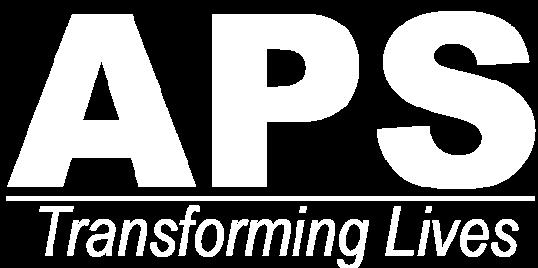
is dedicated to serving vulnerable adults. We investigate reports about abuse, abandonment, neglect, exploitation and self-neglect of vulnerable adults in Washington State. We collaborate with other agencies to offer protective services as needed. Our goal is to promote lives free of harm while respecting individual choice.





FALL 2023 | CONTENTS >> DEPARTMENTS | >> FEATURES | >> 3 Director’s Welcome An in-depth look at the impact that Washington State APS had at this year’s NAPSA conference. 5 Deputy Director’s Welcome Supporting Mental Health During Seasonal Changes 6 Headquarters Spotlight Meet the Administrative Assistant for the APS Deputy Director 7 Employee Spotlight Sharing staff achievements and excellence across Washington 9 Updates & Information Dive into our latest updates on grant projects and policy transformations! 12 Data Update Learn how to make our data tools work for you 16 Regional Success Stories Learn how APS is transforming lives throughout the State 13 CISM Corner Embracing Change: Understanding Your Response Style and Managing Workplace Transitions 15 EDAI Gain a better understanding of the key differences between equality and equity. 17 Getting to Know One Another: Bárbara del Mar Robles Discover the inspiring journey of Bárbara del Mar Robles, a Legal Benefits Advisor at APS. 17 1
13 15 TABLE OF CONTENTS
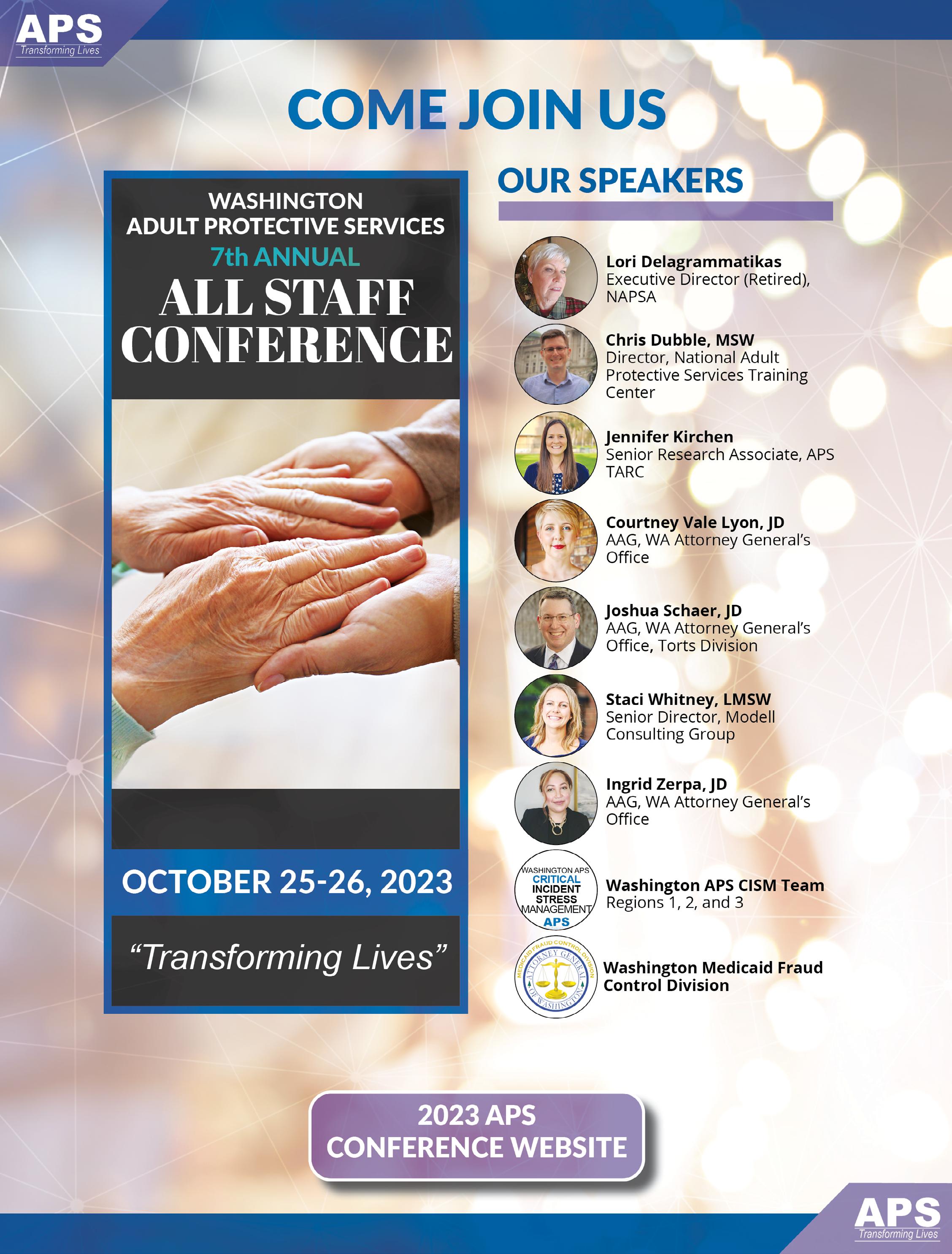
Conference Reminder 2
Boston, Massachusetts

WASHINGTON APS MAKES WAVES AT NAPSA
The National Adult Protective Services Association (NAPSA) recently hosted its 34th annual conference in Boston, Massachusetts. This conference serves as a key gathering for Adult Protective Services (APS) professionals, providing an opportunity to network, share, learn, and problem-solve together. Washington State’s APS program stood out at this year’s conference, with remarkable attendance and the opportunity to present on important topics related to quality and improvement, forensic interviewing, and safety and risk tools.
The titles and presenters for the conference were:
• Unraveling the Mystery of Forensic Interviewing for Adult Protective Services by Cory Bryant and NaQueia Muse
• Quality Assurance: Key Performance Indicators vs. Qualitative Benchmarks by Erika Parmelee and Laura Holloway
• Quality Assurance: Root Cause Analysis and Continuous Improvement by Erika Parmelee and Laura Holloway
• Development and Deployment of Safety and Risk Screening Tools in Washington State by Rebecca Mead and Victoria Gawlik Morse
The NAPSA conference witnessed a recordbreaking attendance of over 1,300 individuals from all 50 states and US territories including the District of Columbia. Various professionals from APS programs, law enforcement, medicine, banking, finance, legal systems, nursing homes/ombudsman, and government agencies came together to enrich the event. Among them, Washington State’s APS program showcased its commitment to excellence, with four presentations accepted by the NAPSA conference committee.
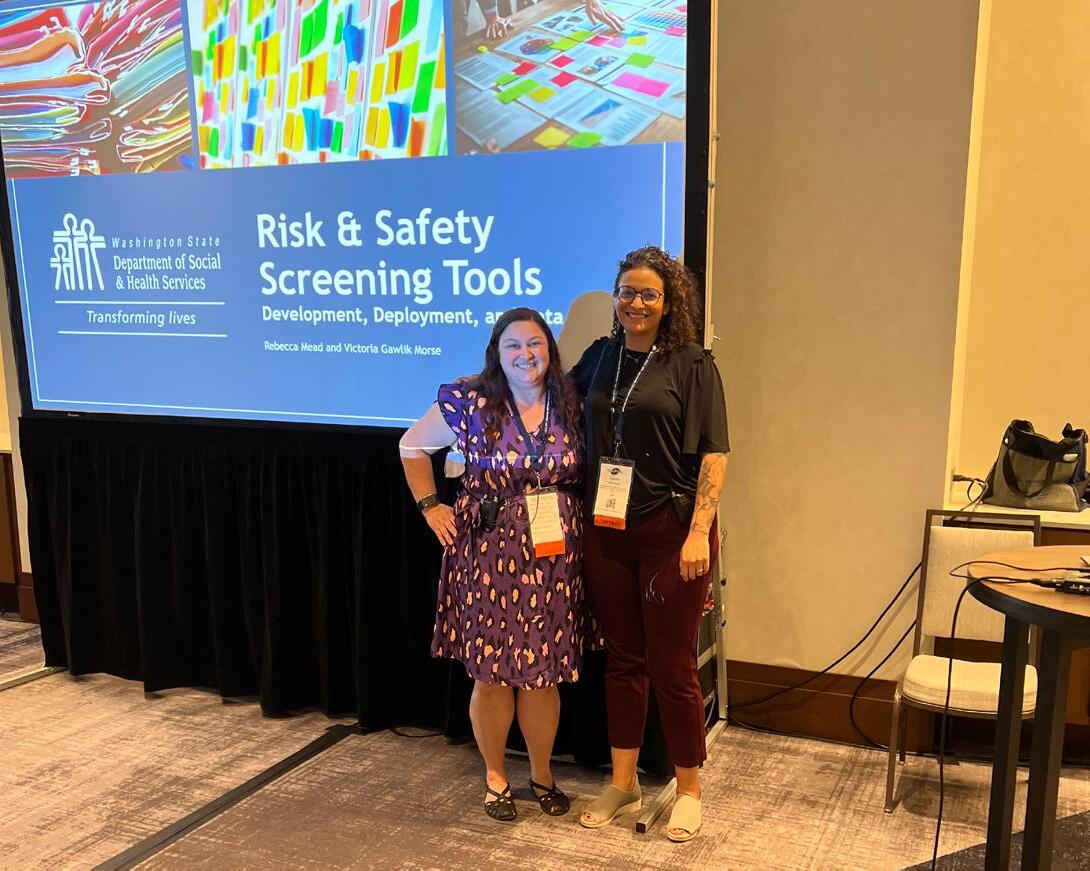
Director’s Welcome
3 1
The presentations from Washington State APS covered a range of important topics, shedding light on the program’s outstanding work. Presenting on forensic interviewing, NaQueia Muse, expressed her gratitude and pride, stating, “Presenting at the NAPSA Conference in Boston, Massachusetts, this year was an amazing experience! I was honored to represent the state of Washington with Forensic Interviewing! It was nice to know Washington is a leader and other states want to learn from us! Thank you all who have supported forensic interviewing! Because of you, we made a national impact!”
The presentations from Washington State APS were incredibly well attended, reflecting the audience’s interest in the topics presented. NaQueia Muse mentioned that their session on forensic interviewing had nearly 100 attendees, with lots of interest in their training. This engagement showcased Washington State as a leader in the field, with other states seeking to learn from our standardized approach.
Erika Parmelee, who presented on quality assurance, shared her experience: “Questions from the participants showed me that not all APS programs have the depth of QA that we have within Washington State.” The engagement and discussions around quality assurance, root cause analysis, and safety screening tools initiated a national dialogue on best practices.
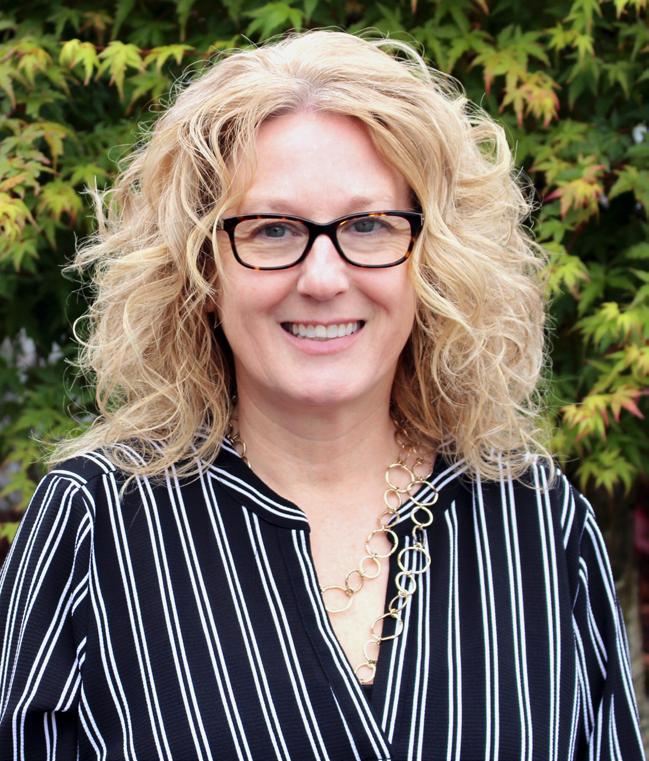
Rebecca Mead expressed her excitement about representing Washington State APS on the national stage. She mentioned the wonderful experience of presenting and monitoring the questions from the attendees, ensuring everyone got a chance to ask and get answers. This inclusive approach further highlighted the commitment of Washington State APS to encouraging dialogue and learning.
Laura Holloway thanked ALTSA (Aging and Long-Term Support Administration) for the opportunity to share information about their quality management system at the NAPSA conference. She expressed her appreciation for the commitment to quality within ALTSA, explaining, “The conference reaffirmed for me how special ALTSA is and my appreciation for our commitment to quality services.”
Having set a high bar for themselves and Washington State, our teams are already contemplating proposed topics for the upcoming 2024 conference in New Mexico. Their dedication to innovation and excellence positions them to make an even greater impact in the field of Adult Protective Services.

The Washington State Adult Protective Services program made significant contributions at the recent NAPSA conference, showcasing its expertise and commitment to quality. The record-breaking attendance and the interest generated by the presentations demonstrated the high regard Washington State APS holds in the field. Their proactive approach to sharing knowledge and expertise reflects their commitment to continuous improvement and making a national impact.
Washington State APS continues to be a trailblazer, setting a benchmark for excellence that others can aspire to in Adult Protective Services.
Way to go, team!
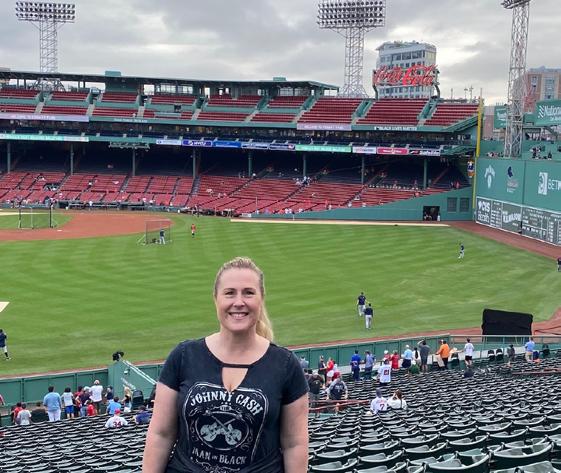
Kathy Morgan Director WA State Adult Protective Services
4
2 3
Photos: 1. Rebecca Mead (left) and Victoria Gawlik Morse (right) at NAPSA | 2. The APS team seeing the sights in Boston | 3. Laura Holloway at Fenway Park
Supporting
Mental Health During Seasonal Changes

Seasonal transitions can bring about noticeable changes in our environment, routines, and overall feelings. The colder temperatures, shorter days, and less sunlight during the winter take a toll on our mental well-being. It’s important to recognize these effects and take steps to take care of ourselves during these times.
One of the things we can do is prioritize selfcare that’s specific to the season. That means making intentional choices to focus on our mental and emotional well-being. It could be as simple as sticking to a regular sleep schedule, exercising, and eating healthy, nutritious food. Incorporating mindfulness techniques, like meditation or deep breathing, may be a great way to manage stress and find inner peace during these times of transition.
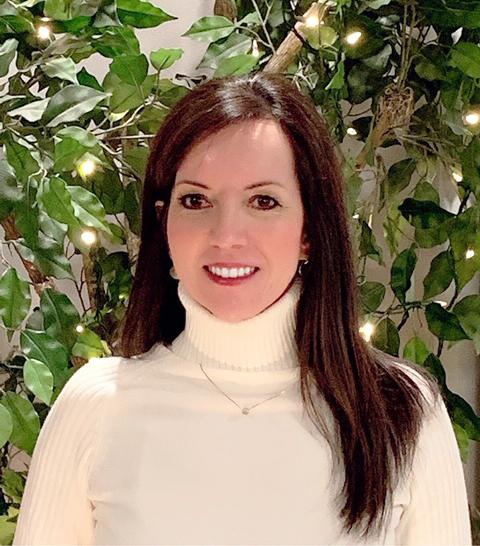
to communicate when we can’t be together physically. Sharing our feelings, experiences, and concerns with trusted individuals can provide comfort and a sense of belonging, making a difference in our mental health.
Also, remember the power of spending time outdoors and connecting with nature. I know when it’s cold outside, the temptation to stay indoors where it’s warm lingers, but, immersing ourselves in the beauty of the seasons can substantially impact our mental well-being. Taking brisk walks in the crisp air, admiring the vibrant colors of fall foliage, or even getting into some colder-weather sports that embrace Washington’s landscapes can uplift our spirits and make us feel more connected to the ever-changing environment.
Lastly, it’s important to remember that help and support are always available. Don’t hesitate to seek professional assistance if you or someone you know is struggling with mental health. Asking for help is a sign of strength and a proactive step towards maintaining our overall well-being.
Paula Hughes, M.Ed., CDE Deputy Director WA State Adult Protective Services
Another important aspect is staying connected with our support networks. As the seasons change, so do social dynamics and opportunities for connection. That’s why keeping in touch with family, friends, and loved ones is crucial, even if it means finding new ways
As a community, let’s create an environment of support, understanding, and empathy during these changing seasons. By prioritizing self-care, staying connected with loved ones, embracing nature, and seeking help when necessary, we can navigate these transitions with resilience and take care of our mental health.
Together, let’s break the stigma surrounding mental health and build a community that supports and uplifts everyone.
Wishing you a harmonious and mentally healthy transition through
the seasons.
Deputy Director’s Welcome
5
Headquarters
Spotlight Administrative Assistant

Mandi Ojeda joined APS in July 2022 as the Administrative Assistant for Deputy Director Paula Hughes. She has jumped right in to provide support to our headquarters staff. Since she started with us, she has grown in her understanding and appreciation for the work of APS. Her grandmother was diagnosed with cancer two years ago and passed away less than a year later. She has learned during those times that there would have been a larger struggle if her family didn’t have the proper support and care. Mandi has since learned how each division works together and appreciates all ALTSA has to offer for her family. Mandi looks forward to being able to keep growing within APS and hopes to keep making a difference by supporting the mission.
Before state service, Mandi worked in the private sector, providing support to military families being relocated and clerical support to several restaurant franchises. Mandi has volunteered for many years with school districts, the YMCA, parks & recreation, and Island Senior Resources, where she found her passion to help others. In Mandi’s daily life, she keeps busy with her feisty cat, Nala, and her ever rambunctious dog, Drako. She loves to do art, read books, and spend time with friends during her free time.

6 HQ Spotlight
Mandi Ojeda Administrative Assistant for the Deputy Director’s Office, WA State Adult Protective Services
Capitol Lake Olympia, WA
EMPLOYEE SPOTLIGHT
Recognizing Excellence in Our Workforce

Positive, caring, and energetic are just a few words that describe Miranda Skalisky who joined the Region 1 Wenatchee/Omak APS team on February 1, 2022. Miranda brought an extensive background in the court systems and juvenile detention for the Wenatchee area. She is a team player, always willing to help and readily shares information on resources and contacts. Miranda demonstrates her excellent work ethic from the time she starts work in the morning until she ends for the day. Miranda is persistent when it comes to her investigations and obtaining protective services, which displays her care for APS clients. She is professional and respectful to everyone.
When Miranda is not at work, she enjoys time with her family or helping at her favorite camp, Zanika Lache at Lake Wenatchee. Miranda is dedicated to helping vulnerable adults and strives to leave them in a better place upon closure of her investigations.
LaTanya Bekoe joined APS in 2013. For the past 10 years, she has worked as an investigator, intake specialist, and promoted to a supervisor in 2018. During her 24 years in social services, her passion has been engaging with the vulnerable population to provide a positive outcome for individuals who may otherwise not be able to advocate for themselves. Her approach in life is always to treat others with respect, dignity, and show compassion. As a supervisor, she believes her role is to share the knowledge and skills she developed throughout her career with her team and coworkers. She is passionate about morale building with staff and will often volunteer to help plan employee related gatherings within the region or the Renton office.
7 Employee Spotlight
LaTanya relocated from Gary, IN in 2005 to the pacific northwest to be closer to family along with raising her daughter and son in a safer environment. Their move to Washington wasn’t easy by any means, however, during the past 18 years many of her co-workers are considered family. She would describe herself as a very kind and patient individual willing to go the extra mile to help anyone in need. During her spare time, she enjoys hanging out with friends and family, traveling, cooking, and event planning.
On April 14, after dating for 4 years, LaTanya married her best friend, Julius Bekoe at Brown Point Improvement Club located on the beautiful Commencement Bay.


Brandy Johnson goes above and beyond in her role as a Region 3 APS supervisor! She not only supports the team she oversees, but she supports her peers as well. She is one of the first supervisors to volunteer to help, no matter what it entails. Brandy does everything she can to assist others and will go out into the field
within a moment’s notice without hesitation. She leads with positivity and encouragement in everything she does. Brandy consistently focuses on being solution based and addresses situations with thoughtfulness and creativity. She cares tremendously for APS employees and the vulnerable adults we serve.

Brandy’s team talks about how she is always cheerful and kind, willing to listen and offers advice. She is adaptable to the needs of her team and treats everyone with respect. Her knowledge is invaluable, and she shows great empathy towards our clients. Her genuine passion for the APS mission, approach to those around her and open-door policy, are just a few of Brandy’s stand-out qualities. She is a true leader, leads with compassion, integrity, honesty, and empathy. Brandy is not afraid to admit she doesn’t know something and is more than willing to learn something new. She has the ability to compliment your best qualities and also identify areas to strengthen and provide support where needed. Region 3 is lucky to have Brandy on the regional management team and in APS!
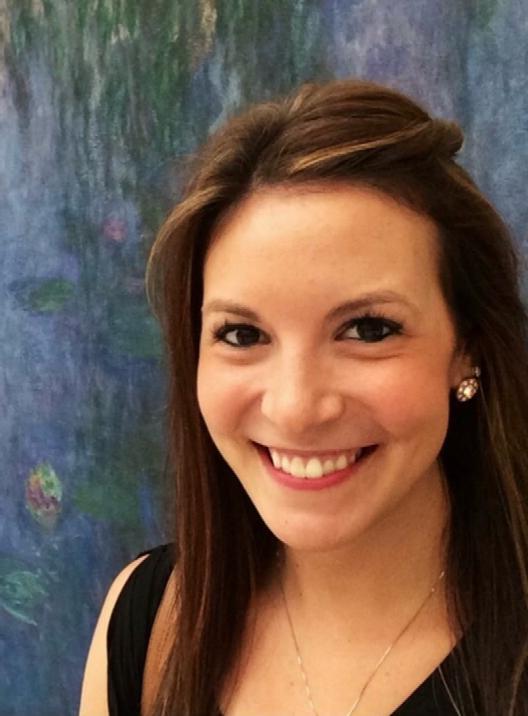 LaTanya Bekoe APS Supervisor Region 2, Renton
Miranda Skalisky APS Investigator Region 1, Wenatchee
LaTanya Bekoe APS Supervisor Region 2, Renton
Miranda Skalisky APS Investigator Region 1, Wenatchee
8
Brandy Johnson APS Supervisor Region 3, Tumwater
Vineyards in Autumn Benton City, WA
Updates & Information
GRANT UPDATES

Grant work was ongoing throughout the summer and updates to major project are included. If you would like to learn more about APS grant or ongoing projects, contact APS Grant Director Victoria Gawlik Morse.
ELDER JUSTICE, COVID RESPONSE AND RELIEF GRANTS
AMERICAN RESCUE PLAN (I & II)
• Goods purchases. Staff may continue to make direct goods purchases for alleged victims.
• Forensic interviewing: Work has begun to merge the forensic interviewing for alleged victims training with the training for alleged perpetrators. Once the two curriculums have been merged, staff will access it as a single training and the way APS moves forward with interviewing.
• Supervisor academy: The outline for the supervisor academy curriculum was approved and the UW Alliance has begun work to develop the content that will comprise the training. Once the curriculum is built, a group of APS trainers will be trained and provided the curriculum Once the train-the-trainer has been completed, the training will become available for staff to take as needed.
Both the Elder Justice Act, and COVID Response and Relief Act grants have been fully expended. The final reports for both grants, documenting all activities throughout their lifecycles, are due at the end of the year.


To maintain good standing with the Administration for Community Living (ACL), preparations have already begun to ensure the timely submission of these reports to our federal partners.
• Case aides: Each region remains staffed with case aides to support their work. All case aides have been fully trained in APS policy and systems and are working tirelessly to support regional staff. The staff are constantly looking for ways to improve the support they offer so don’t hesitate to drop them a hello.
• University of Washington (UW) program evaluation: The final meeting with the evaluation has been scheduled to take place in October. Final recommendations will be considered and shared based on current program initiatives and plans.
9 Updates & Information
• Tribal mini-grants: Five federally recognized Tribes in Washington received funding through APS to enhance services for their vulnerable adult populations. All tribes have fully expended their grant funding.
POLICY UPDATES
• The summer PolicyTech release was a success! The learning curve of a new system came with some inherent challenges, but the benefits of the email notifications, highlighted changes, organized tasks, and knowledge check are just a few of the perks our new system provided. Thank you to all who participated in workgroups and helped shape the newly released polices and the policy modifications to come.
• The launch of the APS Policy Suggestion Box was also a success and received ideas from 23 staff regarding the policy of evidence gathering related to the alleged victim’s decision-making ability. In August, the APS Senior Policy Advisor met with several staff interested in providing additional information to gain a full understanding and began the work on that policy. The next topic for the APS Policy Suggestion Box is specific to documentation modifications . If you have ideas on how to improve the current documentation policy, we’d love to hear them by Tuesday, October 31, 2023! Please submit your ideas for documentation modifications to the APS Policy Suggestion Box.
Understanding Policy webinar series

The APS Policy Team hopes staff have been enjoying the guest speakers at the Understanding Policy webinars as we are currently working on November and December’s guest line up. Since APS often communicates, coordinates,
and make referrals to other entities, we wanted to bring them in to share what they do so that APS can enhance the work that we do. In June, a representative from Residential Care Services (RCS) discussed their regulatory role in provider practice. In August and September, representatives from Home and Community Services (HCS) presented on Medicaid 101 and the Family Caregiver Support Program. If you missed the recent webinars, the recordings are available on the APS Policy SharePoint site.
The APS Policy Team is thrilled to bring you October’s Understanding Policy webinar, Understanding Public Disclosure, held on Wednesday, October 18, 2023 from 10:00am –11:00am. If you are interested in attending, please register by clicking below.

Click to Register
What’s next for the APS Policy Unit?
The policy work continues from the ideas received regarding topics from the Concerns Workgroup, Policy Workshop, and the APS Policy Suggestion Box. Additionally, the ongoing effort to shift APS policy from the Long-Term Care (LTC) Manual into PolicyTech continues with the privacy and torts policies that are currently in LTC Chapter 2b and 2c. Your ongoing collaborative participation is critical in ensuring that the policy enhancements support and reinforce the important work that we do. Keep your ideas coming and we look forward to continuous policy enhancement work with you!
To better support future policy work, training, and enhancements, the APS Policy Unit will soon be hiring for a Policy Program Manager and a Mental Health Transformation Policy Program Manager. We are excited to have the opportunity focus on training and providing resources to support our work with individuals experiencing mental/ behavioral health challenges. If you enjoy policy work and/or have a background in the field of mental health, keep an eye out for the upcoming position announcements.
10
Policy Workshop
As highlighted in the previous newsletter, many changes were made to APS policy over the summer due to statute changes and recommendations from the Policy Workshop.



Specific changes recommended in the Policy Workshop that have been made so far include: removing the requirement for a safety screening case note, clarifying the document received and document reviewed timelines, updating the way we document communication with the assistant attorney general, and the removal of the alleged perpetrator 60-day interview timeframe.
Looking ahead to the end of the year and beyond, the following topics are being discussed for feasibility and integration given program objectives: enhancing TIVA2 to track multiple faceto-face requirements, updating documentation requirements around activities, linking related investigations of the same allegation type, and enhancing TIVA2 for auto-generating case notes for specific activities like uploads.
Additionally, as a direct result from the workshop, the Senior Policy Advisor is coordinating an understanding entities series for the Understanding Policy Webinars. The following entities have been scheduled to present: Home and Community Services (HCS), Residential Care Services (RCS), and Family Caregiver Support. Other entities that are being planned include Development Disabilities Administration (DDA), Attorney General (ATG), Office of Deaf and Hard of Hearing (ODHH), and other partners that APS frequently partners with.
LEGISLATIVE UPDATES
The upcoming 2024 legislative session begins Monday, January 8, 2024, lasting 60 days. Due to a short session, there are currently no plans to introduce new legislation. However, this does not mean there is no legislative work to be done. Throughout the upcoming session, not only will we be reviewing bills for any impacts to ALTSA/APS, the planning process for potential 2025 legislation will start.
More Updates & Information
Updates & Information (continued)
11
Data Update
Learn how to make our data tools work for you!
In June 2023, we released the TIVA2 Investigator Dashboard Power BI (Business Intelligence) Reports, providing the newest reporting resource to help complete work in this busy and demanding environment. Much like our TIVA2 DataMart, Power BI Reports use TIVA2 data to create graphs and other visuals that assist users monitor their performance measures, identify trends, and provides you with a comprehensive tool to help improve the work you do. The APS Investigator Dashboard provides various tools to manage your current caseload and see how your investigation outcomes contribute to the performance measures for APS. The dashboard is designed to allow you to view only your assigned work and for supervisors to view the work assigned to their unit. This report refreshes with data from TIVA2 at the start of every business day. For example, any updates in TIVA2 that occur on a Tuesday will be reflected on the dashboard by Wednesday morning.
The dashboard provides information on tasks you have completed or need to complete on your caseload such as the date of your last case note, when the initial response is due and if it has been completed, pending initial face to face interviews, alleged victims and alleged perpetrators who still need to be linked to person management and much more!
There is a table that displays investigations assigned and closed from month to month
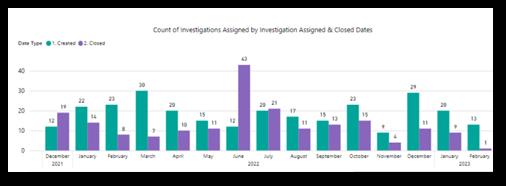
A graph displaying the IFF timeliness by priority

Charts showing your finding percentages and many other features to help you monitor your day to day, month to month, or year to year. For more details using the Investigator
Power BI Report and its features, they can be found within each published report located in the APS Power BI Reports User Guide and the APS Power BI Dashboard Webinar. Both are available on the APS SharePoint Data page.
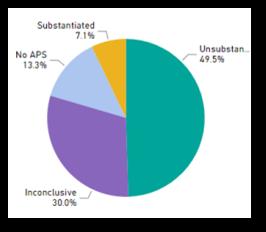
If you are unable to access the APS Investigator Dashboard Reports, please submit an ALTSA IT helpdesk ticket to obtain assistance with getting set up for success!

12 Data Update
MANAGING CHANGE In the Workplace
Submitted by Rebeca Estrada, PhD, Region 2 CISM Program Manager
Change in the workplace is inevitable. For some, simply hearing the word “change” can bring up reactions of fear, concern, anxiety, and frustration, while others may experience feelings of excitement, hope, happiness, and anticipation. The way in which we respond to change can vary given the circumstances. Have you thought about your typical response to change?
Paula Davis, JD, M.A.P.P., Founder of the Stress and Resilience Institute, describes three different response styles to change:

Leapers
Leapers are innovators who jump right in and embrace change. They get on board easily when change happens and are often early adopters to new ways of thinking and doing.
Bridge Builders
Bridge Builders are willing to change, but they need some time to understand it first. They want information and time to think about the implications of the change. Eventually, they will sort through concerns and jump on board, but they usually won’t be among the first wave of adopters.
Tradition Holders
Tradition Holders initial thought is “No, not until you give me a really good reason to change.” They appreciate the way things are and don’t want to lose what is working or what is good about the way things are. They will make sure that if change happens, it’s well handled.
What tends to be your response style? Does your response to change differ when at work versus in your personal life? Once you recognize how you respond to change, you can better manage how you adjust to changes.
13 CISM Corner
If you find that you are not quite ready to jump on board with certain changes, here are some things that might help you work through any trepidation:
• Take some time to think about how this change is going to impact you. Assess the possible challenges and opportunities that could come from the change. If you find yourself focusing on only the negative aspects of the change, reflect on how it might be positive and potentially even present an opportunity for growth.

• As you think about the impact it may have in your work, consider what steps can you take to be more informed about why the change is happening and how it will be rolled out.
• Try to keep up your regular routine. When there are a lot of changes happening, it becomes more important to try to maintain your schedule as much as you can. This can be an anchor that helps remind you that some things are still the same and it also gives your brain one less thing to think about.
• Check in with your colleagues and see how they are managing the change. While it can be helpful to talk about frustrations with one another, if you find that you are getting stuck in venting mode, encourage each other to shift toward action and focus on what is within your control.
• Tap into your own resources and think about how you have managed change in the past. What did you do that was helpful and even not so helpful? By reflecting on your own skills, it not only reminds you of your resilience during times of change, but you can use these skills to guide you through this situation.
If you would like to discuss additional strategies on managing change in the workplace, please don’t hesitate to contact your regional CISM Program Manager.
14
Equality vs. Equity

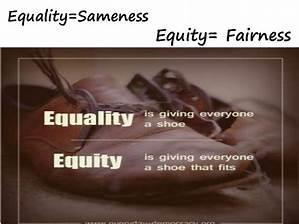
As you can see in the image on the right, there is a distinct difference between equality and equity. Both terms are utilized in the workplace and often misused. Why focus on these terms? It is for equity impact! When going through the process of promoting eq uity by increasing fairness and reducing disparities, you must consider several factors. Below are some questions and examples of various workplace scenarios to consider
Questions an employee may ask when looking for equitable outcomes:
- What am I seeking to accomplish?
- What is within the company’s scope to support my success?
- What actions can I take that supports favorable outcomes for myself and my team?
- What story am I telling myself about my situation?
Questions a manager may ask when exploring equitable outcomes:
- What are we seeking to accomplish?
- What is within my scope to support the employee’s success?

- Have I explored all known possible outcomes?
- Are there possible perceptions/realities of what is done for one employee vs. another?
- What biases might I have about the request received?
TOPIC EQUALITY EQUITY
Recruitment
All people have access to the same opportunity to apply for the same job at the same time and with the same requirements. This is regardless of their age, race, gender, religion, sexual orientation, disability, or other demographics.
New Employee All new employees must attend the same training on person-centered practices.
Performance Evaluation All employee evaluations state the same language, "All team members met expected proficiency."
Employee Expectations
All workers are required to meet expected proficiency of 80% by August 31, 2023.
A person reaches out to apply for the job. However, based on their disability, they cannot complete the online application. The person is requesting additional support to complete the online process and apply for the job.
While attending the training, a person identifies additional supports needed to successfully achieve learning outcomes A dimension of diversity for this person requires more one -on-one interactions vs. group-facilitated practices
New statement: “Over the last review cycle, Mariah had a proficiency rate of 80%, contributing to the team's overall success. ”
There is a new employee who began working with DSHS on January 15, 2023. They need additional time to achieve the expected proficiency goal Perhaps a goal for this employee, is to gradually increase proficiency during their tr ial/probationary period.
For example: By the end of the 3 rd month, expected proficiency goal shall be 30%. Support and coaching of that individual may require person-centered practices to achieve the expected proficiency in a reasonable amount of time. This can be necessary for several reasons, such as:
- Different learning abilities.
- Barriers to learning acronyms, programs, culture, or tools needed for success, etc.
Flexibility
I am a caregiver for a loved one and require a flexible schedule. Or I am a student who needs to attend a class from 2–3 p.m., twice a week. Equality says all employees will have the same schedule of Monday -Friday, 8am-5pm
Equity considers the business and persons need for flexibility. A flex schedule may be granted to support a n individuals need. Equity also considers the business needs of the team, unit, and division. Equity does not imply that a worker is not required to meet job expectations and performance goals. Equity creates opportunities for the employee and manager to collaborate to achieve equitable outcomes for all involved.
Key Takeaway
The examples above are specific with a goal to create opportunities to collaborate and apply a person -centered approach to support each person’s success in their role. Try to refrain from statements such as “This is how we've always done it.”, or “When I was a worker, we couldn't ” Perhaps that is true. Now, we have more innovative options to meet the business needs of ALTSA, employee needs, and achieve client service delivery requirements.
15 Equity, Diversity, Access, and Inclusion iff ren e EDAI
The act of developing, strengthening, and supporting procedural and outcome fairness in systems, procedures, and resource distribution mechanisms to create equitable (not equal) opportunity for all people.
This Photo by Unknown Author is licensed under CC BY
Everyone has the same treatment without accounting for differing needs or circumstances.
thought
REGIONAL SUCCESS STORIES
A little compassion and professionalism can go a long way in transforming the lives of Washington’s vulnerable adults
Region 1
Asocial service specialist with Home and Community Services submitted a referral to APS due to concerns of neglect when the alleged victim’s family moved the client from an assisted living facility into their home without notice or planning. The assisted living facility ensured the client received their medications, insulin, and oxygen when they moved out. Two days after the client moved into their family member’s home, the family member seemed unaware of the client’s need for oxygen, insulin, or any medications. When the APS investigator went to the home to complete the initial face-to-face interview, they discovered the client to be extremely sleepy. The client’s family members attempted to help their family member sit up in their recliner, but remained unresponsive and was only able to mumble a few words. As this was a drastic change for the client, 911 was called and emergency medical services quickly arrived to find the client with an oxygen saturation level of 40.
The client twas moved to an adult family home after their hospitalization. They are happy and has adjusted well to living in an adult family home.
Region 2
APS received a referral for an 86-year-old client who could not care for themself. Their spouse was hospitalized for declining health and expressed concerns for his wife being alone at home without anyone to care for them. The client’s spouse ended up passing away. The client had evidence of cognitive decline and was refusing assistance. The case was brought to the King County Multidisciplinary Team as the client maintained that they were fine and did not require any help. The investigator was able to identify and contact a family member living in Europe who agreed to come to Washington to help the client. The family member became the durable power of attorney and completed paperwork for the client to move into a memory care assisted living facility. They plan to file for guardianship to continue providing the client with ongoing support as their cognition continues to decline.
Region 3
An investigator, reached out to an alleged victim to complete an initial face to face, but upon contact, she quickly discovered the client was in a crisis. The investigator allowed time for the client to talk through her struggles, which provided her time to calm down and begin to process what she was feeling. Once the client was in the right frame of mind to receive the information, the investigator provided her with the Crisis Line contact number. The client utilized the Crisis Line resource and followed up with the investigator to inform her that she was doing much better and no longer in crisis.
The client gained and utilized a valuable resource to help herself out of a crisis. She is now safe and in a better situation because of the contact with APS, and the patience, skill, and experience of the APS investigator.
Regional Success Stories
16
GETTING TO KNOW ONE ANOTHER
Understanding how our unique experiences contribute to a stronger and more diverse workforce
Diversity, Service, and Justice: Meet Bárbara del Mar Robles

In the in the busting world of APS, Bárbara del Mar Robles stands as a testament to dedication and service. As a Legal Benefits Advisor, Bárbara has dedicated herself to upholding the rights and dignity of vulnerable adults, championing their well-being, safety, and inclusion. Through her extensive background and unique experiences, she embodies the core principles our organization.
Bárbara’s role as a Legal Benefits Advisor has been shaped by a life dedicated to advocacy, equity, and justice. She boasts an impressive educational background, marked by her Juris Doctor degree and further specialization with a Master of Laws in Health Law and Policy. Her master’s thesis, which revolved around end-of-life decisions and death with dignity laws, underscores her commitment to understanding the nuanced intersections of healthcare, policy, and law. This rigorous academic pursuit provided her with a unique lens to interpret the ever-evolving landscape of healthcare, from the Affordable Care Act to bioethics and payment systems.
Before her current tenure at APS, Bárbara made significant contributions to the Washington State Bar Association, where she was instrumental in creating continuing legal education programs for newly inducted members. Her previous roles include serving as a domestic violence and sexual assault legal advocate, leading educational programs, teaching high school Spanish, and contributing as an adjunct professor in political science and paralegal studies. Each of these roles has honed her skills and deepened her passion for advocating for marginalized communities.
Bárbara’s experience in trauma-informed practices garnered from her tenure in domestic violence and sexual assault advocacy, offers a unique perspective. As she puts it, “These practices and policies in the workplace are comprehensive and focus on preventing and mitigating stressful events, but
17
Bárbara del Mar Robles, J.D., LL.M Legal Benefits Advisor
Getting to Know One Another
APS Due Process Unit
also increase safety, well-being, productivity, and commitment to an organization.” This expertise has proven invaluable in her current role, where she not only represents APS in administrative proceedings but also supports other APS teams in substantiating findings of abuse.
However, it’s not just her qualifications and past roles that make Bárbara an asset to APS. It’s her unwavering commitment to diversity, equity, access, and inclusion. She speaks candidly of her motivation to enter her field, stating, “From a young age, I have been moved by the desire to help others in underrepresented or marginalized communities,” says Bárbara. “I am personally and professionally committed to advocating for dignity, safety, visibility, and inclusion of vulnerable populations.”
Bárbara praises the collaborative spirit of the APS team, emphasizing their collective dedication to deciphering complex legal matters and crafting solutions. She believes the presence of legal experts like herself at APS is invaluable, offering the capacity to analyze and interpret statutes, regulations, and case law. Yet, it’s not just the expertise she values; it’s the heart behind the work. “What I appreciate most about working for APS are the actions behind the words,” she notes. “It is incredible to work for an organization that is not afraid to admit that there is always room for growth, improvement, and fresh ideas.”
Away from the demanding corridors of APS and the legal world, Bárbara del Mar Robles finds solace and joy in many personal pursuits. With a heart deeply rooted in Puerto Rico, she often dreams of her

homeland and cherishes moments when she can visit family there. Robles shares her life with her husband, Sam, and their cherished Shih Tzu, Bear Milo, creating a tapestry of cherished memories together. An avid reader, she often loses herself in the pages of books, exploring diverse worlds and perspectives. Her culinary passions see her experimenting in the kitchen, while her love for horror movies offers an adrenaline-fueled escape. Robles’ heart beats in rhythm with Broadway melodies, and she showcases her vocal prowess as a soprano in her church choir. A self-proclaimed expert shoe shopper, she enjoys the simple pleasures of finding the perfect pair. Amidst all these hobbies, she continues her advocacy against domestic violence.


When asked about inspiration, Bárbara’s answer was simple yet profound. “My end goal has always been to leave this world better than I found it. That is my inspiration.” This sentiment encapsulates the essence of her journey and her work at APS.
Bárbara’s words of encouragement to the APS workforce resonate with the principles of service and inclusivity: “Our overarching mission is to transform lives; to advocate for safety, well-being, dignity, and visibility of others... It is about what we have given back.” Quoting the legendary Maya Angelou, she adds, “Try to be a rainbow in someone’s cloud.”
18
Photos: 1. Bear Milo the dog | 2. Bárbara with husband Sam |3. Just a few of Bárbara’s culinary works
2 1 3

LET US KNOW! D o you have photos, content ideas, or success stories for the next quarterly APS Magazine? Let us know! Send your thoughts to jesse.dixon@dshs.wa.gov
Gnome Tarn The Enchantments






















 LaTanya Bekoe APS Supervisor Region 2, Renton
Miranda Skalisky APS Investigator Region 1, Wenatchee
LaTanya Bekoe APS Supervisor Region 2, Renton
Miranda Skalisky APS Investigator Region 1, Wenatchee





















